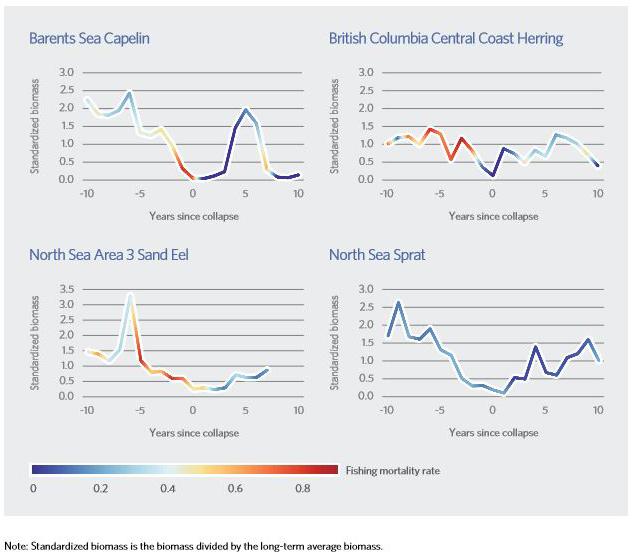Apr 7 2015
A new study shows for the first time that fishing likely worsens population collapses in species of forage fish, including herring, anchovies and sardines. Some of the largest fisheries in the world target these species, and these "baitfish" are also a key source of food for larger marine animals, including salmon, tuna, seabirds and whales.
 Intense fishing often coincides with population collapse. Credit: Pew Charitable Trusts
Intense fishing often coincides with population collapse. Credit: Pew Charitable Trusts
Scientists have long known about wide fluctuations in the abundance of forage fish, including the occasional population collapse. But they had not figured out whether collapses were entirely natural or related to fishing.
The study, published April 6 in the Proceedings of the National Academy of Sciences, implicates fishing in the collapse of forage fish stocks and recommends risk-based management tools that would track a fishery's numbers and suspend fishing when necessary.
"We've identified the fingerprint of fishing on population fluctuations, finding that fishing makes the troughs of population cycles deeper. This is particularly important given the vital role these species play in food webs," said lead author Tim Essington, a University of Washington professor of aquatic and fishery sciences.
As with other studies, this research suggests that precautionary management may be particularly important with forage fish. But this study goes further, using simulations to look at a specific management strategy: suspending fishing when a population falls to less than half of its long-term average. They found that this strategy would prevent 64 percent of collapses, but would reduce the average catch by only 2 percent over the long term.
"The good news is we find that simple strategies can avoid the worst of the ecological impacts, with little costs to fisheries," Essington said. "Widespread application of these types of strategies would sustain the benefits people get from forage fish while allowing for sustainable fishing."
Essington -- also a marine fellow with the Pew Charitable Trusts, the organization that funded this research -- and his colleagues reviewed a large global data set of 55 forage fish stocks. (In the Puget Sound area, the Pacific herring stocks in the Strait of Georgia and along the West Coast of Vancouver Island were surveyed.) Of these, 27 had collapsed at some point, meaning they had fallen to a quarter or less of their average biomass.
To investigate whether fishing was involved, the researchers asked two questions.
First, what was happening before and during the collapse? They found that fishing was particularly intense, about 50 to 200 percent higher than the average rate. The population's growth rate was plummeting at the same time, but this drop could explain only a small number of the collapses.
That pattern suggests that fishing is indeed triggering or exacerbating collapses, but it is only one piece of evidence. So the researchers posed a second question: Do these collapses follow a pattern that would be expected as part of a natural cycle?
One way to answer that is to compare the forage fish stocks with other stocks that are not fished. However, no reliable, long-term data exist to track the abundance of unfished stocks.
The researchers instead compared the forage fish fluctuations to simulations of natural, random fluctuations. To generate these simulations, they used the magnitudes and frequencies of fluctuation in each of the 55 stocks in the data set.
They produced 1,000 simulations based on the assumption that the 55 stocks fluctuated randomly, but with the same amplitude and frequency observed in the real data. They found that collapses were more common in the real stocks than in 97 percent of the simulations, leading them to conclude that fishing is a likely contributor to forage fish collapses.
Forage fish eventually rebound, but the collapses deprive other species of food and fishermen of income for as long as the population is depressed.